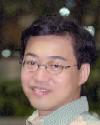Poet
Chen Kehua

Chen Kehua
(Taiwan, 1961)
Biography
Chen Kehua was born in Hualian on the east coast of Taiwan in 1961 and currently works as an ophthalmologist at the Veterans Hospital in Taipei. When I first met him in Taipei last year, he had spent most of his day performing cataract operations, and it is tempting to view his poetry in the same light: as a rigorous though magical procedure for the removal of all the various forms of darkness that beset the human mind.
on TV after dinner
from block after block of towering high-rise downtown apartments
a succession of young fathers hurries off to dispose
of the day’s accumulated information and emotion
before tonight’s garbage collection
inviolable, this city rhythm – Good evening.
Would you like to own your own home too?
inviolate, this adult destiny. every night
before the garbage truck shows up, all the young fathers rush out
to dispose of themselves
There is more, of course. In the poetry he wrote in the 1980s, alongside the refusals of ‘normality’, there is also a strong emphasis on the imagination: reality was not only to be criticized – it had to be entirely reimagined as well. Playfully surreal, as well as darkly erotic, Chen Kehua’s poetic mind-games are often infused with a disconcerting mixture of violence and humour. In ‘Promise’ (1982), he writes:
the first time we met, he cut off a finger and gave it to me
on account of the promise we made
he said: You’ll get over it. Don’t wait for me
I have six fingers on my right hand
the second time we met, he plucked out a pearl-grey eyeball
while mounted on horseback and presented it to me before departing, because
from that moment on I was no longer a virgin
I said: I suppose you’ve got a third eye somewhere, have you?
he laughed.
In more recent poetry written during the 1990s, it would seem that Chen Kehua’s poetry has become both more speculative and introspective. Buddhist elements are very conspicuous. You could say that this is a logical development of his rejection of consumerism, because the most essential aspect of the consumer mentality is the idea of an individual self that expresses its ‘uniqueness’ in patterns of consumption and lifestyle choices. For Chen Kehua, the self is no longer something you can simply take for granted. In a number of poems from the collection Engaging in a Complicated Poetry for the Sake of Death, he tries to express a Buddhist sense of detachment:
me, I borrowed his body
and that segment of the flow of time
my coming into this world was like a surrealist painting
and from that moment – awesome – there was grief/joy
desire and ambition – these I understand
although I’m only borrowing
but suddenly I clean forgot the full story
including the fact that I too was once a universe
Ultimately for the poet, the self is a delusion, and act of auto-hypnotism, and poetry becomes one means with which to attempt a kind of awakening to the inconceivable: selfless awareness. This awareness, however, is virtually impossible to achieve in the practice of everyday life, since the societies virtually all of us inhabit are based on, and organized around, the notion of a personal ego. In “an age of replication and chatter” as Chen Kehua describes it in the poem ‘Walking’, all the poet can do is to help us undermine the obsession we have with the self; it is up to the reader to develop those insights in her own life. For this reason, stranded between the empty conformities of social expectation and Buddhism’s vision of a transpersonal consciousness, the poet – understandably– falls prey occasionally to an all too human sense of absurdity, of despair:
in dreams we watch the hidden stage
of a studious planet
waiting for the entrance of meaning
but the plot gives no clues
symbols and sublimation
the farce taking time such a limited span of time . . .
“as for me . . .”
everyone leaving their seats
is as baffled as when they came in . . .
This despair, however, has not yet stopped Chen Kehua, and he continues to create, baffled more than most by the quiet desperation of existence, yet capable of distilling a most unsettling, compelling poetry from it.
© Simon Patton
I would like to thank Yenney Lai for all her help with these translations – her advice and insights have been invaluable.Bibliography
Qijing shaonian Whale Boy (poems, 1981)
Wo jiandao yi ke toulu I Picked Up a Skull (poems)
Xingqiu jishi Planet Chronicle (poems)
Wo zai shengming zhuanwan de difang Where Life Turned (poems)
Yu gudu de wujin youxi Endless Games with Loneliness (poems)
Qiankantou shi Head-hunting Poems (poems, 1995)
Bie ai moshengren Don’t Make Love to Strangers (poems, 1997)
Meili shenshui de Yaxiya Beautiful, Mysterious Asia (poems)
Yinwei siwang er jingying de fanfu shipian Engaging in a Complicated Poetry for the Sake of Death (poems, 1998)
Hua yu lei yu heliu Flowers and Tears and Rivers (poems, 2001)
Poems
Poems of Chen Kehua
Sponsors
























